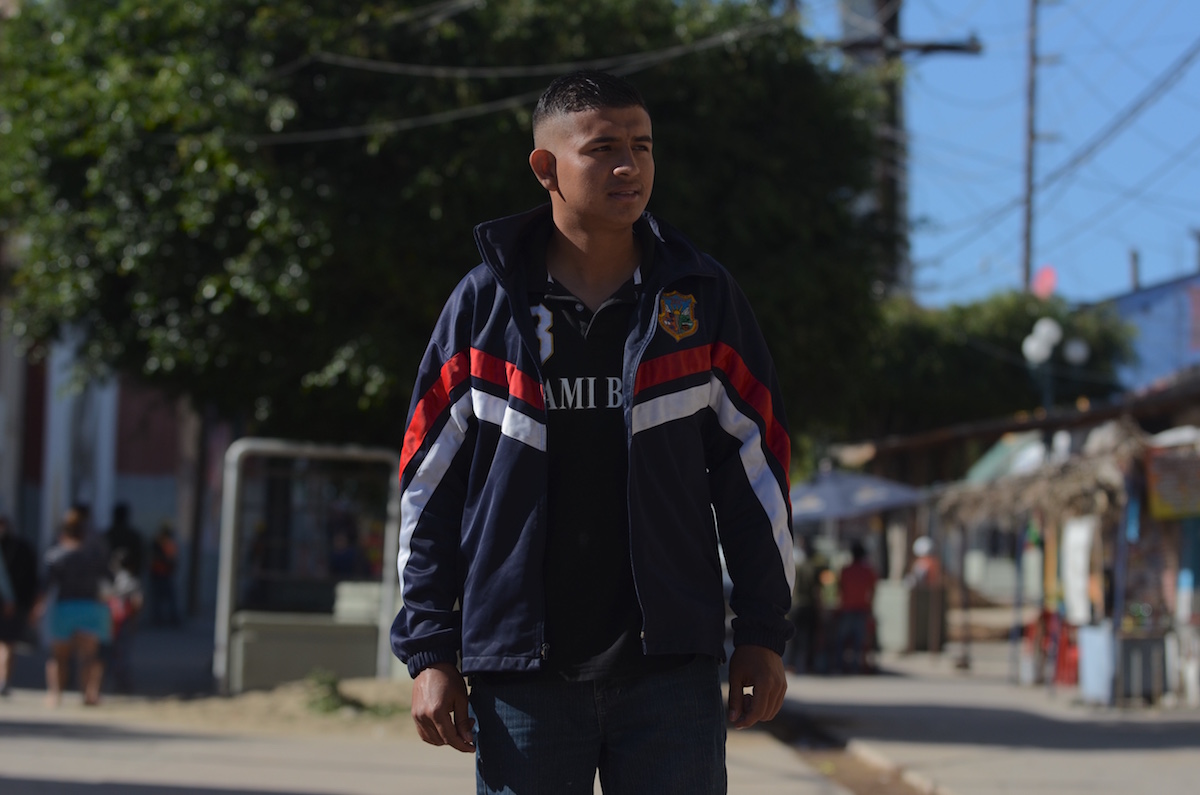[dropcap size=big]M[/dropcap]eet Darwin, a kid in Tijuana with a dream. Darwin David Aguilar is 19 years old and a migrant waiting for his chance to request asylum in the North. He says a relative is waiting for him in San Bernardino, where he could find work, but eventually he’d like to live in Los Angeles.
He asks if SB is closer to TJ than LA is, so I draw a map for him on my notepad, showing that the distances are more like a triangle. Tijuana is the gateway in both directions.
Darwin is a native of San Pedro Sula, Honduras, where the current migrant caravan began. But he wasn’t in it. He’s been here for a month. Darwin tells me his hometown is “beautiful, just like Tijuana,” but he had to abandon it. One day a group of Maras went to his house and told him he had to join their gang, or die.
“I didn’t know what they wanted from me, but they wanted me in the gang,” Darwin says. “They gave me just three days to think about it. And if I didn’t join them, they’d kill me.
“On the second day, I came here,” he explains. “On the third day, they went to my house to look for me, to kill me.”
This border city remains its reliable self.
On buses, he went from Tapachula, in Chiapas, to Guadalajara, to Sinaloa, and finally to TJ. He arrived here on October 27. Right away, Darwin found a job at a carwash in Tijuana, which affords him the chance to have a fresh haircut and use a bit of gel. Darwin is dapper.
“I met a peaceful person, a Christian, and he gave me work,” Darwin says. “With God’s will, I hope to get asylum over there, get a work permit, so I can help my family in Honduras.”
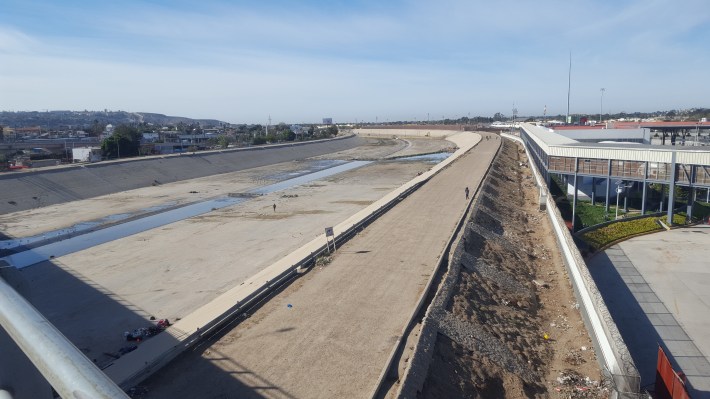
[dropcap size=big]A[/dropcap]t first glance, Darwin seems to have the discipline and optimism that any highly developed country in constant need of migrants for economic health would fight over to have in the people reaching its shores. But it won’t be easy for him.
Everyday since his arrival, Darwin has been checking on the unofficial asylum waiting list at the Chaparral port-of-entry. That is where between 40 to 100 people enter in one day to request refugee status in the United States. On the Tijuana side, the migrants themselves keep the handwritten waiting list, which extends for weeks and weeks.
When the last person to manage it goes in, the next people in line take over.
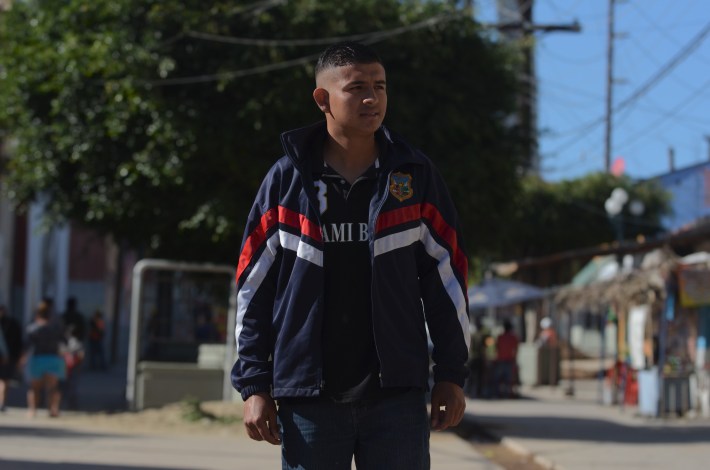
Darwin has avoided the migrant camp at the Deportivo Benito Juarez. He frowned upon the protest on Sunday that turned chaotic and violent, resulting in U.S. agents using tear gas against migrants and a six-hour closure of the border that caused millions of dollars in losses for businesses on both sides.
Indeed, if you step just a few blocks away from the alarming scene at the Tijuana migrant shelter, this border city remains its reliable self. Thumping bars and vendors beckon on Avenida Revolución. The Plaza Río and Chapultepec districts hum with the activity of new restaurants that look plucked from Sunset or Beverly boulevards in L.A.
And despite Sunday’s temporary border shutdown, people and vehicles are crossing the border normally, in both directions, round the clock — same as ever. For Tijuana natives, this is a binational region with a binational mindset.
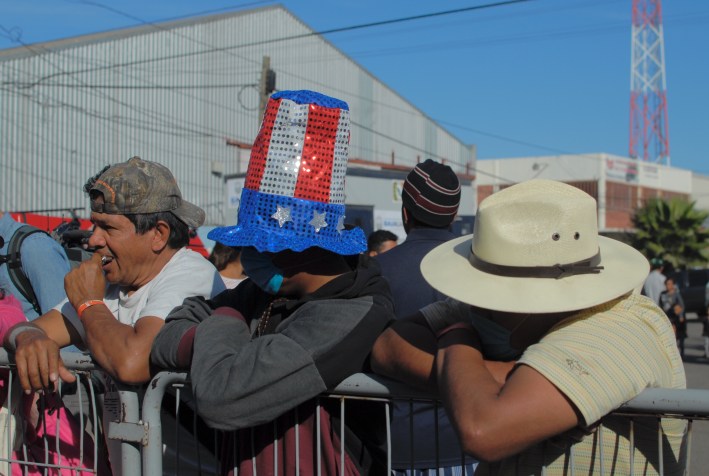
The “business as usual” vibe is also present at the port’s gates. Every morning the list is updated. On the day I meet Darwin, he and his friend Bladimir, also from San Pedro Sula, learn they are about to have their number called up.
Bladimir Muñoz is 21. He had a small business back home selling candy and peanuts, until gang-members began extorting and threatening him. “I had to pay ‘taxes’,” he says. "I just want to help my family."
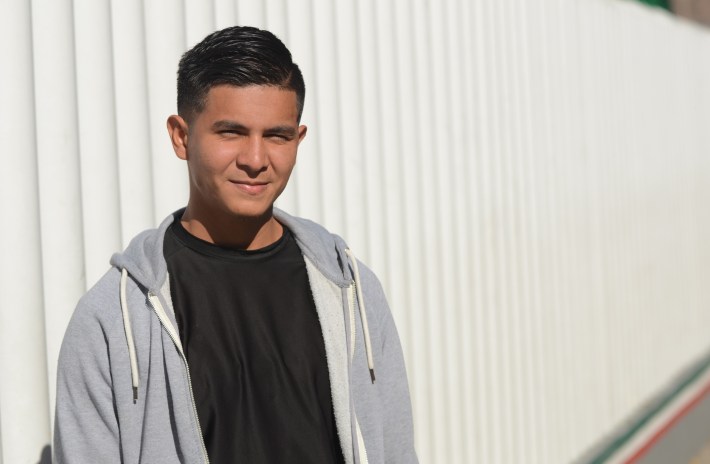
[dropcap size=big]B[/dropcap]oth guys learn in the morning that their numbers approach. They gather at the Chaparral gate, before touristy-looking human-size letters that spell out M-E-X-I-C-O and T-I-J-U-A-N-A.
People from Central America, Haiti, other parts of Mexico, and from even farther away, wait in line along a fence. I meet a Kurdish man who is claiming political asylum from Turkey. All expect to walk up to the United States, meet an agent, and claim asylum. They are then sent to a detention center, to wait to get processed further.
The migrants are essentially in line for their turn to enter an American jail. Compared to what they’re fleeing, they say, the chance is worth the wait.
“If there were no Maras,” Darwin says, about life in Honduras, “it would be much more peaceful.”
Turns out, Darwin and Bladimir will have to wait one day more. That afternoon, Number 39 on the list shows up after all, pushing their spots back a bit. They'll be here the next morning, to wait all over again.
"I'm happy, either way," Bladimir says. "I thank God for the opportunity given to me ... It's almost my turn."
RELATED: A Harrowing Look Inside the Refugee Migrant Shelter in Tijuana
